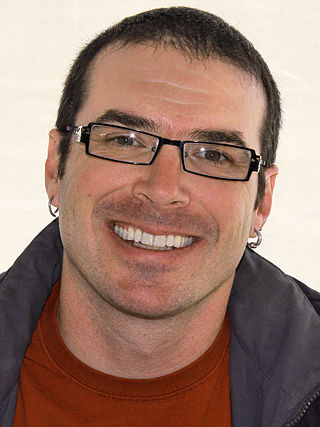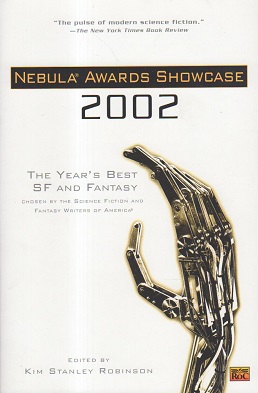Related Research Articles

Octavia Estelle Butler was an American science fiction author and a multiple recipient of the Hugo and Nebula awards. In 1995, Butler became the first science-fiction writer to receive a MacArthur Fellowship.
Gordon Rupert Dickson was a Canadian-American science fiction writer. He was inducted into the Science Fiction and Fantasy Hall of Fame in 2000.

Nancy Anne Kress is an American science fiction writer. She began writing in 1976 but has achieved her greatest notice since the publication of her Hugo- and Nebula-winning novella Beggars in Spain (1991), which became a novel in 1993. She also won the Nebula Award for Best Novella in 2013 for After the Fall, Before the Fall, During the Fall, and in 2015 for Yesterday's Kin. In addition to her novels, Kress has written numerous short stories and is a regular columnist for Writer's Digest. She is a regular at Clarion Workshops. During the winter of 2008/09, Nancy Kress was the Picador Guest Professor for Literature at the University of Leipzig's Institute for American Studies in Leipzig, Germany.
"The Little Black Bag" is a science fiction novelette by American Cyril M. Kornbluth, first published in the July 1950 edition of Astounding Science Fiction. It won the 2001 Retroactive Hugo Award for Best Novelette and was also recognized as the 13th best all-time short science fiction story in October and November 1971 Analog Science Fact & Fiction poll, The Reference Library review article, tied with "Microcosmic God" by Theodore Sturgeon. It was among the stories selected in 1970 by the Science Fiction Writers of America as one of the best science fiction short stories published before the creation of the Nebula Awards. As such, it was published in The Science Fiction Hall of Fame Volume One, 1929–1964.

Paolo Tadini Bacigalupi is an American science fiction and fantasy writer. He has won the Hugo, Nebula, John W. Campbell Memorial, Compton Crook, Theodore Sturgeon, and Michael L. Printz awards, and has been nominated for the National Book Award. His fiction has appeared in The Magazine of Fantasy & Science Fiction, Asimov's Science Fiction, and the environmental journal High Country News. Nonfiction essays of his have appeared in Salon.com and High Country News, and have been syndicated in newspapers, including the Idaho Statesman, the Albuquerque Journal, and The Salt Lake Tribune.
The New Hugo Winners was a series of books which collected science fiction and fantasy short-form works that had recently won a Hugo Award for best Short Story, Novelette or Novella. Published by Baen Books, the series succeeded Doubleday's The Hugo Winners following that series' discontinuation after volume five. The New Hugo Winners ran for four volumes, published in 1989, 1992, 1994, and 1997, together collecting stories that had won the award from 1983 to 1994. The first two volumes were edited by Isaac Asimov. Due to Asimov's death in April 1992, the third volume was edited by Connie Willis and the fourth by Greg Benford.

"Speech Sounds" is a science fiction short story by American writer Octavia E. Butler. It was first published in Asimov's Science Fiction Magazine in 1983. It won Butler her first Hugo Award for Best Short Story in 1984. The story was subsequently collected in Butler's anthology Bloodchild and Other Stories and in the science fiction anthology Wastelands: Stories of the Apocalypse.
Dark Matter is an anthology series of science fiction, fantasy, and horror stories and essays produced by people of African descent. The editor of the series is Sheree Thomas. The first book in the series, Dark Matter: A Century of Speculative Fiction from the African Diaspora (2000), won the 2001 World Fantasy Award for Best Anthology. The second book in the Dark Matter series, Dark Matter: Reading the Bones (2004), won the World Fantasy Award for Best Anthology in 2005. A forthcoming third book in the series is tentatively named Dark Matter: Africa Rising. This was finally published at the end of 2022 under the title Africa Risen: A New Era of Speculative Fiction, from Tor Books.

Bloodchild and Other Stories is the only collection of science fiction stories and essays written by American writer Octavia E. Butler. Each story and essay features an afterword by Butler. "Bloodchild", the title story, won the Hugo Award and Nebula Award. It was first published in 1995. The 2005 expanded edition contains the additional stories "Amnesty" and "The Book of Martha".

Terry Carr's Best Science Fiction of the Year is an anthology of science fiction short stories edited by Terry Carr, the fourteenth volume in a series of sixteen. It was first published in paperback by Tor Books in July 1985, and in hardcover and trade paperback by Gollancz in October of the same year, under the alternate title Best SF of the Year #14.

The 1985 Annual World's Best SF is an anthology of science fiction short stories edited by Donald A. Wollheim and Arthur W. Saha, the fourteenth volume in a series of nineteen. It was first published in paperback by DAW Books in June 1985, followed by a hardcover edition issued in September of the same year by the same publisher as a selection of the Science Fiction Book Club. For the hardcover edition the original cover art by Frank Kelly Freas was replaced by a new cover painting by Richard Powers.
Rachel Swirsky is an American literary, speculative fiction and fantasy writer, poet, and editor living in Oregon. She was the founding editor of the PodCastle podcast and served as editor from 2008 to 2010. She served as vice president of the Science Fiction and Fantasy Writers of America in 2013.

The Year's Best Science Fiction: Fifth Annual Collection is an anthology of science fiction short stories edited by Gardner Dozois, the fifth volume in an ongoing series. It was first published in hardcover and trade paperback by St. Martin's Press in May 1988, with the latter reprinted in June 1994. The first British edition was published in hardcover and trade paperback by Robinson in September 1988, under the alternate title Best New SF 2.

Nebula Awards 20 is an anthology of award winning science fiction short works edited by George Zebrowski. It was first published in hardcover and trade paperback by Harcourt Brace Jovanovich in November 1985.
Sarah Pinsker is an American science fiction and fantasy author. She is a nine-time finalist for the Nebula Award, and her debut novel A Song for a New Day won the 2019 Nebula for Best Novel while her story Our Lady of the Open Road won 2016 award for Best Novelette. Her novelette "Two Truths and a Lie" received both the Nebula Award and the Hugo Award. Her fiction has also won the Philip K. Dick Award, the Theodore Sturgeon Memorial Award and been a finalist for the Hugo, World Fantasy, and Tiptree Awards.

Nebula Awards Showcase 2002 is an anthology of award-winning science fiction short works edited by Kim Stanley Robinson. It was first published in trade paperback by Roc/New American Library in April 2002.
Monidipa "Mimi" Mondal is an Indian speculative fiction writer based in New York. She writes in many genres, including science fiction. Mondal is the co-editor of Luminescent Threads: Connections to Octavia E. Butler, an anthology of letters and essays, which received a Locus Award in 2018. It has been nominated for a 2018 Hugo Award, and the William Atheling Jr. Award. Mondal is the first writer from India to have been nominated for the Hugo Award.
Dexter Gabriel, better known by his pen name Phenderson Djèlí Clark, is an American speculative fiction writer and historian, who is an assistant professor in the department of history at the University of Connecticut. He uses a pen name to differentiate his literary work from his academic work, and has also published under the name A. Phenderson Clark. This pen name, "Djèlí", makes reference to the griots – traditional Western African storytellers, historians and poets.
"Of Mist, and Grass, and Sand" is a science fiction short story by American writer Vonda N. McIntyre. First published in Analog Science Fiction and Fact in October 1973, it was anthologized multiple times, and also formed the first chapter of McIntyre's 1978 novel Dreamsnake. Set after a nuclear holocaust, "Of Mist, and Grass, and Sand" tells of Snake, a healer who uses the venom of three genetically engineered snakes to heal, and follows her effort to heal a nomad boy of a tumor. The story won the Nebula Award for Best Novelette in 1974. It was also nominated for the Hugo Award in the same category, and for the Locus Award for Best Short Fiction. Scholar Anne Hudson Jones called it a powerful story, and stated that its themes were "mythic and universal".

Women of Wonder, the Contemporary Years: Science Fiction by Women from the 1970s to the 1990s is an anthology of short stories, novelettes, and novellas edited by Pamela Sargent. It was published in 1995, along a companion volume, Women of Wonder,The Classic Years: Science Fiction by Women from the 1940s to the 1970s.
References
- ↑ Bibliography: the Evening and the Morning and the Night, at the Internet Speculative Fiction Database; retrieved June 11, 2014
- ↑ Bloodchild and Other Stories, by Octavia Butler, published 1995 by Four Walls Eight Windows
- ↑ Bast, Florian. "I Hugged Myself": First-Person Narration as an Agential Act in Octavia Butler's "The Evening and the Morning and the Night", in Black Intersectionalities: A Critique for the 21st Century. Published in print: 2014 Published Online: May 2014 ISBN 9781846319389
- ↑ Lavender, Isiah, III. "Digging Deep: Ailments of Difference in Octavia Butler's "The Evening and the Morning and the Night"." Black and Brown Planets: The Politics of Race in Science Fiction. Ed. Isiah Lavender, III. Jackson, MS: UP of Mississippi, 2014. 65-82. ISBN 978-1628461237
- ↑ "Annotated Bibliography of Butler's Fiction." Strange Matings: Science Fiction, Feminism, African American Voices, and Octavia E. Butler. Ed. Rebecca J. Holden and Nisi Shawl. Seattle: Aqueduct Press, 2013. 274-292.
- ↑ "The Locus Index to SF Awards: 1988 Theodore Sturgeon Memorial Award". Locus . Archived from the original on 2013-01-27. Retrieved 2014-06-11.
- ↑ 1988 Nebula Awards, at the Internet Speculative Fiction Database; retrieved June 11, 2014
- ↑ 1988 Locus Poll Award, at the Internet Speculative Fiction Database; retrieved June 11, 2014
- ↑ Out of Control: Octavia Butler’s Bloodchild and Other Stories, by Jo Walton, at tor.com; published September 22, 2009; retrieved June 11, 2014
- ↑ Butler, Octavia at the Encyclopedia of Science Fiction ; by John Clute and Peter Nicholls; published April 28, 2014; retrieved June 11, 2014